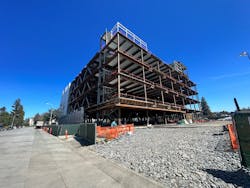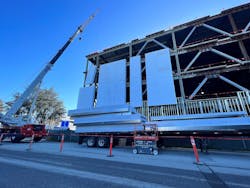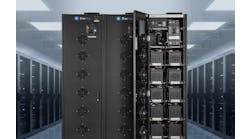AMT's CoreSite Builds 9th Data Center in Silicon Valley, Adds Capacity in Denver
American Tower Corporation (NYSE: AMT) subsidiary CoreSite recently announced a significant footprint expansion in its Silicon Valley campus, as well as a key expansion in its Denver data center campus. The company said the moves serve to answer growing capacity and power demands in these regions, and will help meet the digital infrastructure requirements of its customers, who include public and private cloud providers, enterprises, and network and service providers, for interconnection and hybrid IT capabilities.
As DCF's Rich Miller reported almost exactly one year ago in a story unpeeling the details of AMT adding Stonepeak as an investor in its cloud-to-edge data center strategy, "American Tower has advanced its data center strategy on several fronts, consolidating its CoreSite acquisition with its data center assets, and lining up infrastructure investor Stonepeak for a $2.5 billion equity stake in its data center business."
DCF sees American Tower working toward a future in which its network of 43,000 communications towers across North America will serve as extension of the cloud, bringing content from massive server farms to the edge of the network. As characterized by Miller's reporting, "Data centers will be the connective tissue in the company’s vision for edge computing, which is why American Tower paid $10.1 billion to acquire data center operator CoreSite [in 2021]."
In the transaction last year, for its paying $2.5 billion, Stonepeak acquired a 29 percent stake equity position in the American Tower data center platform. As reported by DCF, at that time the companies said the deal would kick off a “new long-term strategic partnership,” with American Tower overseeing the day-to-day management of its U.S. data center business, and Stonepeak obtaining certain governance rights.
The CoreSite deal was a striking move into the data center business for American Tower, the world’s largest owner of wireless infrastructure who exceeds more than $7 billion in annual revenue.
As recently explained by American Tower President and CEO Tom Bartlett in a talk with Rick Prentiss, head of telecom services research for Raymond James, at the NAREIT REITweek 2023 Investor Conference in June : "On the data center platform side of the business, as you well know a couple of years ago, we acquired CoreSite. I was on the board in another data center company, and became kind of enthralled with the model that they had built in their business [...] This year, we have a CapEx program of 1.7 billion or 1.8 billion, and we're investing in the highest growth opportunities possible, which is leading with our build-to-suit program [where] we'll build roughly 4,000 towers in the markets that we operate. We probably built 20,000 - 25,000 over the last several years. And so we're generating double digit types of returns on that build [...] We don't build on spec. We get a carrier on as an anchor, and we're building in areas where we believe we'll be able to get that second tenant on [...] And that also gets us closer and closer to our customers. Because as they're densifying their networks, they're looking for competent players out there that are going to be able to deliver what they say and when they say it. And so that's been a really steady growth for us going forward."
Bartlett added:
The second piece of the capital is back into our data center platform. When we underwrote the CoreSite acquisition, they were a REIT. They were paying a dividend of 200 million plus. And so the way we underwrote that transaction was, okay, we're going to feed that $200 million back into the business for growth this year. We're probably up in the 350 range, but they have a fair amount underdevelopment up in San Francisco and New York, Miami, Denver, Virginia to be able to meet kind of that pent-up demand that's going on in the business. And so that's also kind of a double digit type of return on investment."
CoreSite SV9
In May, CoreSite reported that it is adding its ninth data center in Santa Clara, California, with the construction and development of a new 240,000 SF data center located at 2915 Stender Way. With the addition of the new facility, dubbed SV9, the company said its Silicon Valley data center campus will amount to 1.179 million SF in total space.
According to CoreSite, SV9 will offer 34 MW of IT load and will include a new utility substation onsite.
As Dgtl Infra's Mary Zhang has noted, Silicon Valley’s technology industry is responsible for much of the market’s data center growth, with customers including Apple, Google, Meta Platforms, Netflix, Nvidia, Salesforce and many others all headquartered and leasing data center capacity in the area.
As further noted by Zhang, Northern California has a constrained power supply. Pacific Gas & Electric (PG&E) and Silicon Valley Power (SVP) are the main power providers serving Silicon Valley, with electricity rates among the highest for Tier-1 data center markets in the U.S.
Elaborating on Northern California’s power supply issues, quoted by Dgtl Infra on August 4, 2022, DigitalBridge CEO Marc Ganzi, remarked: "The power grid in California is somewhat compromised. Pacific Gas & Electric really can’t supply any material amount of new megawatts in the Santa Clara area or San Jose. Silicon Valley Power currently is constrained in terms of what they can deliver. The next upgrade to that grid is 2025. So Santa Clara has become a very capacity-tight market.” DigitalBridge owns a stake in one of Silicon Valley’s largest competitive hyperscale data center operators, Vantage Data Centers.
In terms of development milestones achieved, CoreSite reports that construction of SV9 has progressed since securing building permits in 2022. The company said it has completed building the structural steel and concrete pours for the facility, and has begun the installation of the exterior skin systems, with building dry-in planned by this summer.
Despite experiencing historically rainy and windy weather conditions in the Santa Clara area, as of May, CoreSite said it remains on schedule for completion of SV9 in 2024, with first phase occupancy slated for Q1 2024, and pre-leasing available now.
Spanning Milpitas, San Jose and Santa Clara, CoreSite's overall Silicon Valley footprint has heretofore been comprised of eight operational data centers.
The company contends that it "offers one of the largest retail and wholesale campuses in the Bay Area with a natively dense network and robust cloud ecosystem." The company noted that the massive scale of its Santa Clara campus is fortuitously coupled with the availability of native cloud on-ramps within one of the world's largest concentrations of internet and technology companies.
CoreSite said these qualities uniquely enable it to support a broad range of colocation use cases from enterprises and digital platforms. Further, through its Open Cloud Exchange (OCX) software-defined networking platform, the company said its customers can realize the superior interconnection capabilities needed "to reach new markets, rapidly scale on-demand, reduce total cost of operation, and accelerate IT modernization." CoreSite added that the OCX platform is geared to meet the most demanding compute needs of digital platforms via its rich ecosystem of 205 available cloud, network and IT service providers.
A barrier to exit?
Regarding CoreSite's interconnection capabilities, as further characterized by AMT President and CEO Bartlett in his interview at NAREIT REITweek 2023:
"Where in the tower business, we had a strong barrier to entry from a competitive perspective -- which is our exclusive ownership of the real estate itself and control of that real estate, which really gives us a competitive position in the market versus anyone else -- on the data center side, we have really what I call a 'barrier to exit'. Because on the data center side, the way that CoreSite approaches the market, and what really got me kind of energized about that model, is that it's not just a co-location business: I call them interconnection hubs. A certain piece of that particular data center will be leased to enterprise accounts, a certain piece will be service providers, and then a certain piece will be a cloud player. And so our enterprise customers have this incredible interconnection system within those businesses.
As a matter of fact, over 80% of our revenue that we generate within our data center business, those customers have at least five connections within that [system]. And so it makes it very difficult once an enterprise account has that kind of access to suppliers, to other customers -- obviously has cloud access, might be multi-cloud access -- if we have Microsoft and Amazon, for example, in there, it becomes very difficult for them to leave. That's what got me so excited about that particular model in and of itself, and we had 10% growth in the first quarter."
Ramping Up in Downtown Denver
Meanwhile in May, CoreSite also announced that its downtown Denver data center (DE1) has completed the design and permitting process and is gearing up to add another 3,420 SF and 500 kW of IT load capacity. The expansion at DE1 will increase the total square footage in CoreSite’s Denver campus to 37,420.
Located at 910 15th Street, DE1 is one of the most interconnected data centers in the Denver metro region. Known as a fiber-rich colocation hub in a market that offers nearly year-round free cooling. Denver is also home to major data centers from Flexential and Iron Mountain.
Strategically located in downtown Denver, CoreSite said its DE1 and DE2 data center facilities deliver two network-rich data centers and one of the region’s largest peering exchanges. CoreSite notes its Denver operation sits at the nexus of where the networks meet in the Rocky Mountain region, and bills its DE1 facility as "a network-dense asset for connectivity needs, including native cloud onramps, i.e., direct connection, to the top cloud providers."
CoreSite said it is currently pre-leasing the DE1 expansion, which will be available for customers in 2H 2023.
“With expansions in both our Silicon Valley and Denver markets, CoreSite is delivering on our long-term strategy to meet the ever-increasing data center capacity demands and interconnection requirements of our valued customers,” concluded Juan Font, President and CEO, CoreSite, and SVP of U.S. Tower. “Our strong financial backing by Fortune 375 wireless infrastructure leader, American Tower, and private equity partner, Stonepeak, means we have the direct access to capital required to grow with our customers to anticipate and build solutions for their future needs.”

Matt Vincent
A B2B technology journalist and editor with more than two decades of experience, Matt Vincent is Editor in Chief of Data Center Frontier.






